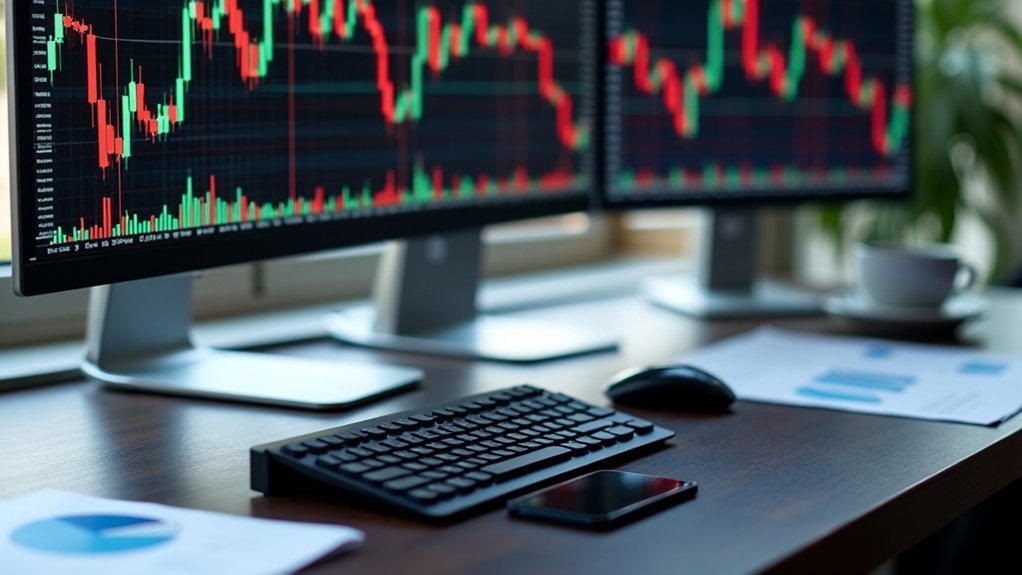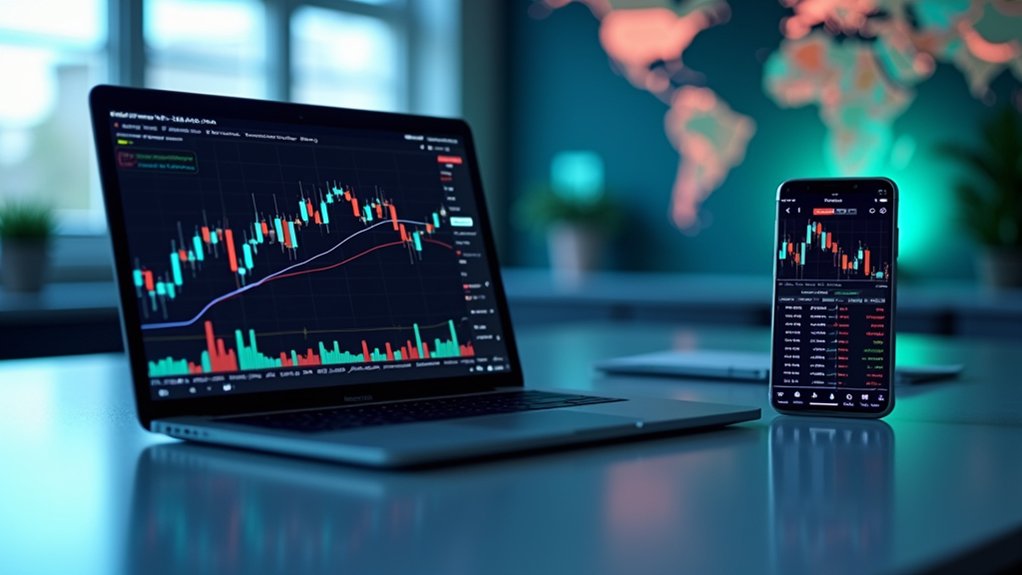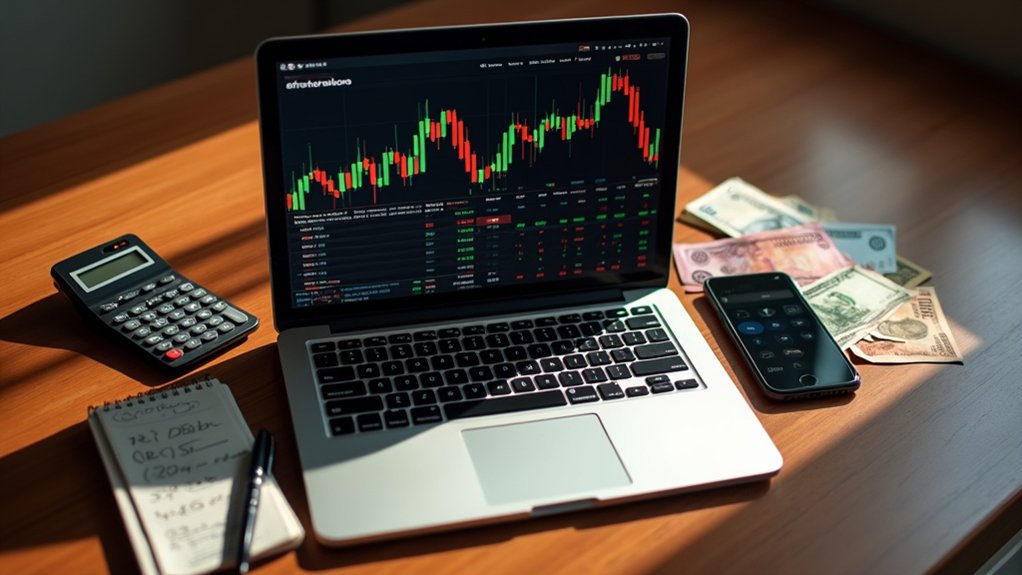A forex trading platform is software that connects a trader's orders to the global currency market. MetaTrader 4 dominates in Africa because every broker offers it and it simply works. MT5 added more features but adoption lagged. Some brokers push proprietary systems with integrated research, while web platforms skip downloads entirely. Mobile-first matters since smartphones outnumber desktops across the continent. The platform is just infrastructure—it won't make anyone profitable, but a bad match creates unnecessary friction. The choice depends on what a trader's broker supports and whether the features align with actual needs.

The platform question—it's where most African traders actually start, not with strategy or risk management or any of that textbook stuff. They're googling “best forex app” from Lagos or Nairobi or Johannesburg, hoping some magic software will open trading success. It won't. But understanding what these platforms actually do matters more than most realize.
MetaTrader 4 dominates across the continent. MT4 is everywhere because it works, supports algorithmic trading through expert advisors, and pretty much every broker operating in Africa offers it. MetaTrader 5 came later with more order types and assets beyond forex, but adoption's been slower. Traders stick with what they know. Both platforms handle the technical side—charts, indicators, automated strategies—without much fuss. The MetaTrader 4 vs MetaTrader 5 debate centers on whether the additional features justify switching from a proven platform.
MT4 dominates because it works and every broker offers it—traders stick with what they know, not what's newest.
Then there are proprietary platforms like SaxoTraderGO, SaxoTraderPRO, and FOREX.com‘s own systems. These come with integrated research, advanced charting, custom dashboards. Saxo Bank gets praised for deep liquidity and premium tools, but premium usually means premium pricing too. CMC Markets throws over eighty currency pairs at traders with strong educational content. OANDA‘s been around twenty-five years, offering specialized currency tools that serious traders appreciate. FOREX.com operates with major regulatory oversight, supporting both MetaTrader and their own tech. The platform delivers nearly 150 technical indicators updated in real time, critical for fast-moving currency markets.
Web-based platforms like OANDA Trade and Plus500 prioritize simplicity. No downloads, just log in and trade. Plus500 targets retail traders specifically, clean interface, fast execution, easy for beginners who don't want algorithmic complexity. Mobile platforms matter deeply in Africa where smartphone penetration exceeds desktop access. Brokers like Moomoo and Webull emphasize mobile-first design with real-time data and on-the-go execution.
Copy trading appears on platforms like ATFX, letting traders replicate strategies from experienced accounts. It's popular because it feels like a shortcut. Whether it actually works long-term is another story entirely.
Regulation varies wildly depending on where the broker operates. Leading platforms comply with authorities like CFTC, NFA, FCA when serving those markets. For African traders, this matters less directly unless they're using internationally regulated brokers. Leverage limits, margin requirements, fund safety—all depend on regulatory jurisdiction. US clients face strict NFA requirements, fifty-to-one leverage caps on major pairs. Islamic accounts exist for traders requiring swap-free compliance.
Accessibility's improved. Minimum deposits dropped, with some brokers requiring zero upfront. Educational resources—tutorials, webinars, market analysis—are standard now, though quality varies dramatically. Many platforms now offer free educational resources that help beginners develop currency trading skills without additional financial investment beyond their trading capital. AvaTrade (Official Site 🔗) specifically serves African markets with localized trading conditions and multiple account options tailored to regional needs. Understanding foreign currency pairs and how they interact is fundamental knowledge that platforms facilitate but cannot substitute for actual trading education.
The platform itself won't make anyone profitable. It's just infrastructure. But choosing the wrong one adds unnecessary friction to an already difficult endeavor. Most African traders end up on MT4 through whatever broker accepted their deposit method. Sometimes that's fine. Sometimes it's not.
Common Questions
Which Platforms Accept Mobile Money Deposits From African Traders?
Exness, HFM, FXPesa, CM Trading, SuperForex, XM, Scope Markets, IQ Option, Tickmill, and Pepperstone all accept mobile money from African traders. M-Pesa dominates East Africa, while MTN Mobile Money and Airtel Money cover West and Central regions.
Minimum deposits start ridiculously low—$1 at SuperForex, up to $200 at Pepperstone. Most process deposits instantly or within hours.
Focus is heavy on Kenya, Nigeria, South Africa, and Ghana. Not all brokers support all countries equally, though. Coverage depends on regulation and demand.
Do Platforms Charge Extra Fees for Deposits in African Currencies?
Most platforms don't charge direct deposit fees for major currencies like ZAR—brokers such as Pepperstone, Tickmill, and XM keep deposits free.
The catch? If you're depositing in NGN, KES, or other non-supported African currencies, conversion fees kick in. These aren't usually platform charges—they come from payment processors or intermediary banks.
Plus500, for example, hits conversions with up to 0.7% fees. ZAR account holders dodge this. Everyone else? Not so lucky.
Can I Trade During Load Shedding or Internet Outages in Africa?
Load shedding kills your connection to the platform. No power, no trades. Internet outages do the same thing—you're basically locked out.
Some African traders run backup systems: generators, solar panels, mobile data as a failsafe. Setting stop-losses before the lights go out helps limit damage.
South African traders especially know this drill—they check Eskom schedules like it's part of their morning routine. Trading during blackouts? Not happening unless you've planned ahead.
Are Metatrader Platforms Available in French or Portuguese for African Traders?
Yes, both MT4 and MT5 support French and Portuguese—along with 36 other languages. That matters across Francophone West and Central Africa, plus Lusophone markets like Mozambique, Angola, and Guinea-Bissau.
Traders change language via View → Languages, then restart. Works on desktop, web, mobile.
Most brokers serving African markets offer these localized versions, lowering barriers for non-English speakers. It's standard, not special—MetaTrader's been multilingual for years.
Which Brokers Allow Trading With Nigerian Naira or Kenyan Shilling Accounts?
Exness, FXTM, HFM, FreshForex, JustMarkets, Alpari, and Quotex allow Nigerian traders to open NGN-denominated accounts. FxPro also supports direct NGN accounts with local deposit methods. Most require proof of Nigerian residency.
KES accounts? Basically nonexistent. Kenyan traders get USD accounts instead, even though brokers like Exness and FXTM operate there. M-Pesa deposits work, but the actual trading happens in dollars.
Nigeria gets the better deal here—no conversion fees, faster banking, local payment options. Kenya's still waiting.










